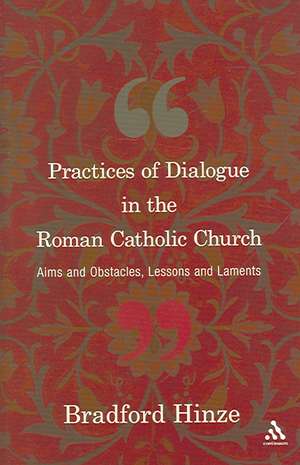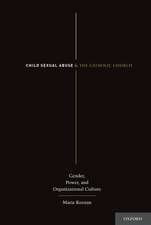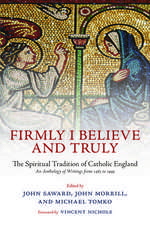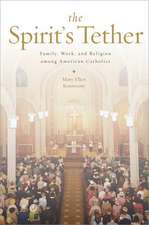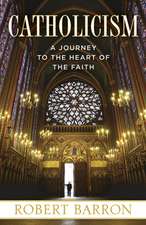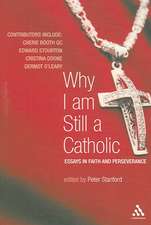Practices of Dialogue in the Roman Catholic Church: Aims and Obstacles, Lessons and Laments
Autor Bradford E. Hinzeen Limba Engleză Hardback – 3 mar 2006
Preț: 500.52 lei
Preț vechi: 562.39 lei
-11% Nou
Puncte Express: 751
Preț estimativ în valută:
95.80€ • 104.10$ • 80.53£
95.80€ • 104.10$ • 80.53£
Carte tipărită la comandă
Livrare economică 19 aprilie-03 mai
Preluare comenzi: 021 569.72.76
Specificații
ISBN-13: 9780826417213
ISBN-10: 0826417213
Pagini: 336
Dimensiuni: 162 x 228 x 30 mm
Greutate: 0.64 kg
Editura: Bloomsbury Publishing
Colecția Continuum
Locul publicării:New York, United States
ISBN-10: 0826417213
Pagini: 336
Dimensiuni: 162 x 228 x 30 mm
Greutate: 0.64 kg
Editura: Bloomsbury Publishing
Colecția Continuum
Locul publicării:New York, United States
Recenzii
"He examines the process of consultation behind the U.S. bishops' pastoral letters of the 1980's, raising important theological questions about how much authority such collective works have." - Commonweal, July 14, 2006
"A unique element of the book is that Hinze uses doctoral dissertations as a source of his data. The dissertation is often overlooked yet it represents some of the most intensive research on particular questions available to scholars. In general, the amount of detailed documentation Hinze provides for his claims is impressive." - Monastic Interreligious Dialogue, July 2006
"Rarely do the title and subtitle of a book tell as accurately as these the contents that lie between the covers...The book is both a historical narrative and a theological analysis of the practices of dialogue in the Roman Catholic Church in the post-Vatican II era at ten sites: the parish pastoral council, the diocesan synod, 'The Call to Action,' the pastoral letters of the U.S. Bishops' Conference, 'The Catholic Common Ground Initiative,' general chapters religious congregations of women, the synod of bishops, ecumenical dialogues, and interreligious dialogues." -Peter C. Phan, Horizons, Vol. 34, No. 2, Fall 2007
"Hinze undertakes a detailed review of dialogue intended to promote reflection over the past forty years concerning changes brought on by Vatican II. He examines its effects at various levels within the church. He also incorporates dialogu from persons of other churches and otehr faiths as well as the 'border society'... Practices of Dialogue would be good for anyone interested in the changes that occurred in the Catholic Church as a result of the Second Vatican Council or for readers wondering about changes to come." -Congregational Libraries Today
"It may seem to many observers that catholicism and dialogue are unlikely partners, but Bradford hinze's latest book comprehensively undermines any such assumptions. Nine of the ten chapters of this exhaustively researched work examine various kinds of dialogue... In each chapter Hinze lays out with admirable fairness the origins of the dialogue, its successes and failures." -Journal of Religion
"Practices of Dialogue is a helpful analysis, and critique of the early decades of reception, interpretation, and theology of dialogue in the post-Vatican II church. The Catholic Church is early on in the process of becoming a church characterized by communion in dialogue. This volume should be helpful to both the theoretical formulation of a theology of dialogue and the pastoral assessment of the skills, challenges, and imperative of building a dialogic community in discerning its mission and articulating its faith for the modern world. This study of the early decades of the reception, implementation, and theological elaboration of the dialogue component of this theology will serve well as both record of and challenge to the Church on its eschatological pilgrimage." - Brother Jeffrey Gros, Theological Studies, December 2006
"For teachers and scholars, this book provides good, readable introductions to each of the selected topics, including helpful historical background and bibliographic references. For those invested in one or another of the dialogues featured therein, it offers something far more valuable: an opportunity to connect our specific endeavours to a more comprehensive vision and to reflect on our practices more critically, in light of wisdom gained in other contexts. If, as Hinze asserts, dialogue "provides the most important means to promote genuine communion" within the Church (259), then his study represents a very useful resource for fostering such dialogue and promoting such communion." - Reid B. Locklin, Toronto Journal of Theology, July 2008
"A unique element of the book is that Hinze uses doctoral dissertations as a source of his data. The dissertation is often overlooked yet it represents some of the most intensive research on particular questions available to scholars. In general, the amount of detailed documentation Hinze provides for his claims is impressive." - Monastic Interreligious Dialogue, July 2006
"Rarely do the title and subtitle of a book tell as accurately as these the contents that lie between the covers...The book is both a historical narrative and a theological analysis of the practices of dialogue in the Roman Catholic Church in the post-Vatican II era at ten sites: the parish pastoral council, the diocesan synod, 'The Call to Action,' the pastoral letters of the U.S. Bishops' Conference, 'The Catholic Common Ground Initiative,' general chapters religious congregations of women, the synod of bishops, ecumenical dialogues, and interreligious dialogues." -Peter C. Phan, Horizons, Vol. 34, No. 2, Fall 2007
"Hinze undertakes a detailed review of dialogue intended to promote reflection over the past forty years concerning changes brought on by Vatican II. He examines its effects at various levels within the church. He also incorporates dialogu from persons of other churches and otehr faiths as well as the 'border society'... Practices of Dialogue would be good for anyone interested in the changes that occurred in the Catholic Church as a result of the Second Vatican Council or for readers wondering about changes to come." -Congregational Libraries Today
"It may seem to many observers that catholicism and dialogue are unlikely partners, but Bradford hinze's latest book comprehensively undermines any such assumptions. Nine of the ten chapters of this exhaustively researched work examine various kinds of dialogue... In each chapter Hinze lays out with admirable fairness the origins of the dialogue, its successes and failures." -Journal of Religion
"Practices of Dialogue is a helpful analysis, and critique of the early decades of reception, interpretation, and theology of dialogue in the post-Vatican II church. The Catholic Church is early on in the process of becoming a church characterized by communion in dialogue. This volume should be helpful to both the theoretical formulation of a theology of dialogue and the pastoral assessment of the skills, challenges, and imperative of building a dialogic community in discerning its mission and articulating its faith for the modern world. This study of the early decades of the reception, implementation, and theological elaboration of the dialogue component of this theology will serve well as both record of and challenge to the Church on its eschatological pilgrimage." - Brother Jeffrey Gros, Theological Studies, December 2006
"For teachers and scholars, this book provides good, readable introductions to each of the selected topics, including helpful historical background and bibliographic references. For those invested in one or another of the dialogues featured therein, it offers something far more valuable: an opportunity to connect our specific endeavours to a more comprehensive vision and to reflect on our practices more critically, in light of wisdom gained in other contexts. If, as Hinze asserts, dialogue "provides the most important means to promote genuine communion" within the Church (259), then his study represents a very useful resource for fostering such dialogue and promoting such communion." - Reid B. Locklin, Toronto Journal of Theology, July 2008
